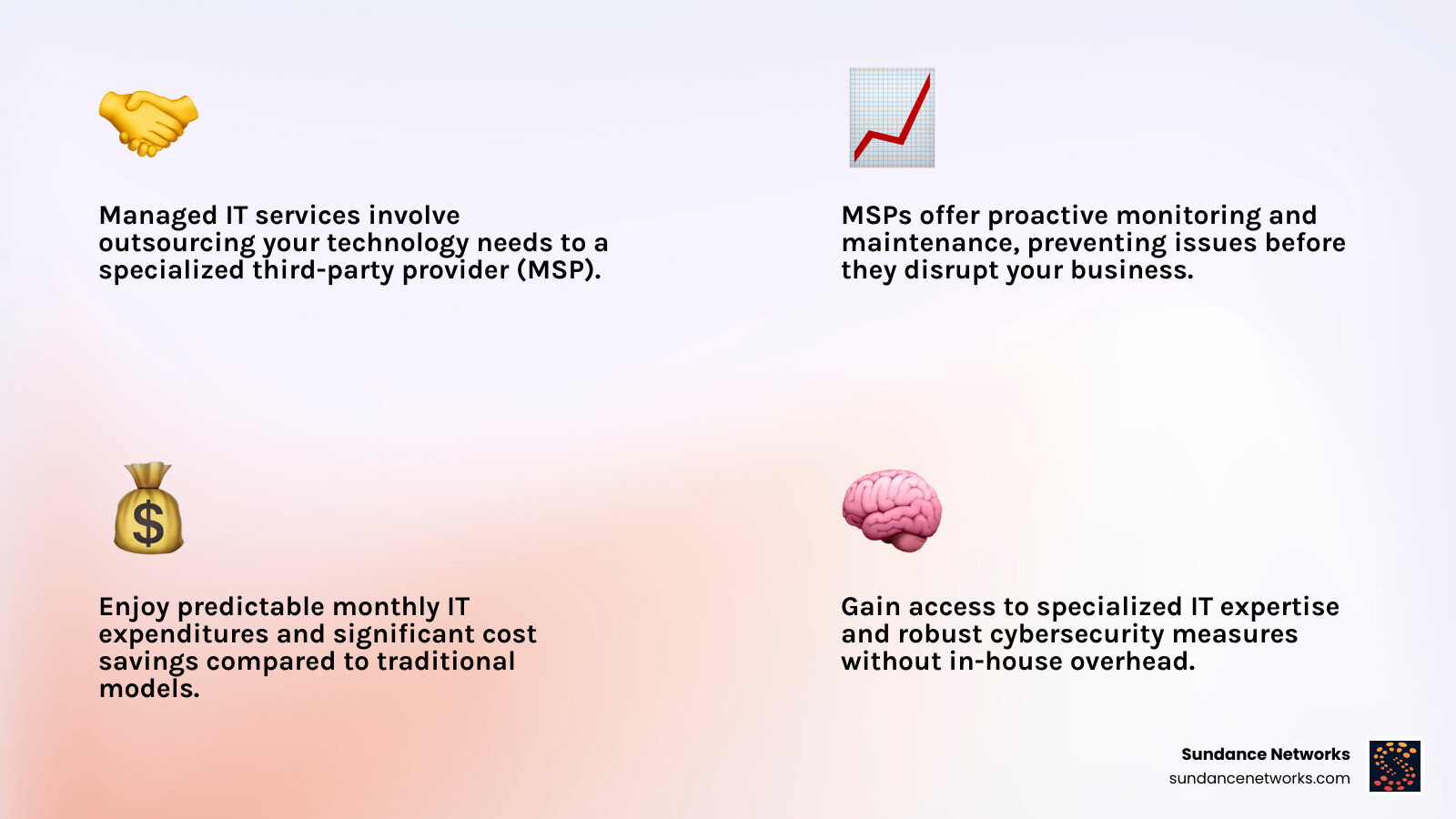Open uping Business Potential with Managed IT Services
The world of business technology is always changing, and keeping up can feel overwhelming. That’s where managed services in it industry come in, offering a smart and proactive way to handle your tech needs.
For those wondering exactly what managed IT services are, here’s a quick overview:
- Managed IT services involve outsourcing IT tasks to a third-party vendor (a Managed Service Provider, or MSP).
- These services are typically delivered on a subscription basis, often with predictable monthly fees.
- They cover a range of IT functions, from monitoring and maintenance to security and help desk support.
- The goal is to ensure smooth, secure, and efficient IT operations, freeing up your internal team to focus on core business.
Historically, businesses often waited for technology to break before fixing it, a “break/fix” model. But today, a proactive approach is key. Managed services move you from reacting to problems to preventing them, giving you peace of mind and a competitive edge.

What Are Managed IT Services and Who Provides Them?
Managed IT services represent a strategic approach where organizations outsource the responsibility for maintaining and anticipating their IT needs to a third-party vendor.
This enables businesses to keep critical networks, endpoints, and data operating smoothly and securely without the high upfront costs and ongoing complexities of building and maintaining an extensive in-house IT infrastructure.
We enable businesses to relieve workload from their internal teams, supplement existing IT departments, or even replace them entirely, ensuring 24/7/365 coverage and providing access to specialized knowledge.
The Shift from Break/Fix to Proactive Support
Traditionally, IT support often operated on a “break/fix” model. This meant waiting for an IT system or device to fail before taking action. Imagine your car breaking down on the highway before you ever thought about an oil change – that’s the break/fix approach to IT.
This model offered on-demand services and billed customers only for work done after an issue occurred, it came with significant limitations. Unpredictable costs, extended downtime, and reactive problem-solving often led to considerable business disruption and financial strain.
The evolution of managed services in it industry ushered in a paradigm shift. Managed services emerged as a proactive alternative, focusing on continuous monitoring, maintenance, and predictive issue resolution. This transition began in the 1990s with Application Service Providers (ASPs) focusing on remote support, eventually expanding into the broader Managed Service Provider (MSP) model we see today.
Instead of merely fixing what’s broken, we aim to prevent issues before they occur, ensuring higher reliability and significantly reducing downtime. This proactive stance is designed to keep your systems healthy and operational, much like regular maintenance keeps your car running smoothly.
The Role of a Managed Service Provider (MSP)
A Managed Service Provider (MSP) is the third-party company that delivers these outsourced IT tasks. We proactively monitor and manage a customer’s server, network, system infrastructure, cybersecurity, and end-user systems against a clearly defined Service Level Agreement (SLA). This agreement outlines the scope of services, performance metrics, and responsibilities, ensuring accountability and transparency.

Our core responsibilities as an MSP include:
- IT Infrastructure Management: Overseeing the health and performance of your servers, networks, and hardware. This includes everything from patching and updates to full system maintenance.
- End-User Systems: Managing and supporting the devices your employees use daily, such as computers, laptops, and mobile devices.
- Technical Support: Providing help desk services, often 24/7, to address user issues, troubleshoot problems, and offer immediate assistance.
- Cybersecurity Oversight: Implementing robust security measures, monitoring for threats, and ensuring compliance. We focus on proactive defense, including threat detection and response, security configuration, patch management, vulnerability assessments, and security awareness training. Our specialized expertise in cybersecurity allows us to handle the increasing complexity of cyber threats, something that many internal IT teams struggle with due to the sheer volume and sophistication of attacks. Learn more about our Cyber Security Services.
- Vendor Management: Acting as a single point of contact for all your IT-related vendors, simplifying communication and ensuring seamless integration of services.
We act as an extension of your team, providing the expertise and resources to manage your IT environment, allowing your organization to focus on its core business objectives.
The Core Benefits of Adopting Managed Services in the IT Industry
Ready to make your business run smoother and smarter? Diving into managed services in it industry isn’t just about handing off tech tasks; it’s about achieving a whole new level of efficiency, security, and peace of mind. We’ve seen how these benefits truly empower businesses like yours to shine in today’s world.
Achieve Predictable Budgeting and Cost Savings
One of the biggest headaches for businesses is unexpected costs, especially when it comes to IT. With the old “break/fix” model, you never knew when a tech emergency would strike, leading to sudden, expensive repairs. But with managed services in it industry, those surprises become a thing of the past.
Managed services typically work on a fixed, monthly subscription. Imagine knowing exactly what your IT costs will be each month – no more guessing games! This predictable fee helps you budget smarter and avoid costly, last-minute fixes.
This also changes how you view IT spending. Instead of big, one-time purchases for hardware and infrastructure (which is called Capital Expenditure, or CapEx), you shift to a predictable monthly operating cost (that’s Operational Expenditure, or OpEx). This frees up cash that you can then reinvest right back into your core business or other growth opportunities.
Plus, because MSPs work with many businesses, they can offer top-tier tools and expertise at a fraction of the cost you’d pay trying to do it all yourself. It’s why the global managed services market is expected to keep growing, showing just how much value businesses find in this approach. We can help you with your IT Budget Planning to make the most of your investment.
Gain Access to Specialized Expertise and Technology
In today’s rapidly changing tech world, finding and keeping top-notch IT pros can feel like finding a needle in a haystack – and an expensive one at that! This is often called the “talent gap.” Managed services in it industry bridge this gap by giving you immediate access to a whole team of certified experts. Instead of hiring many full-time staff, each with a specific skill, you get an entire squad covering everything from network engineering to cybersecurity.

This means your business benefits from the latest tools, software, and industry best practices without you having to worry about buying licenses, setting things up, or training your team.
We constantly invest in advanced security tools, monitoring platforms, and smart automation solutions to keep your systems protected and running smoothly. For instance, think of advanced security services like Managed Detection and Response (MDR) and Extended Detection and Response (XDR). These use smart AI and 24/7 human expert support to stop threats, but they’re often too complex and expensive for individual businesses to set up on their own.
Beyond just tech know-how, MSPs bring invaluable knowledge about compliance. If your business deals with sensitive data or is in a regulated industry like healthcare (think HIPAA), finance (like PCI, NYCRR 500), or handles international data (GDPR), navigating tricky rules is a must. Our expertise ensures your IT systems are not only secure but also fully compliant, helping you avoid legal risks and penalties. We also offer Regulatory Compliance Services to help you stay on track.
By choosing managed services, your in-house team is freed from those daily IT tasks. This means they can really focus on the big-picture projects that help your business grow and innovate. They can dedicate their energy to what they do best, knowing that your IT infrastructure is in capable hands, working reliably 24/7.
A Breakdown of Common Managed IT Services
When we talk about managed services in it industry, we’re referring to a broad spectrum of offerings designed to cover every facet of your IT environment. These services can be bundled together for a comprehensive solution or selected à la carte to supplement your existing capabilities.
Think of it as building a custom IT support system perfectly custom to your business needs, ensuring you get exactly the help you need, when you need it.
Key Types of Managed Services in the IT Industry
When you partner with an MSP for managed services in it industry, you’re open uping a suite of specialized offerings designed to keep your business running smoothly. Think of us as your dedicated IT co-pilot, covering all the bases so you don’t have to.
One of the foundational services is Network & Infrastructure Management. This is all about keeping the heart of your IT system healthy. We continuously monitor, maintain, and manage everything from your servers (whether they’re physical, virtual, or in the cloud) to your network devices like routers and firewalls. Our goal is simple: ensure everything performs at its best, apply all necessary updates, and fix any issues before they cause a headache, minimizing frustrating downtime.
Managed Security is absolutely critical. Cyber threats are always evolving, so having robust protection isn’t just nice, it’s a must-have. Our security services include a wide range of defenses. We’re talking about smart threat detection, quick responses to incidents, top-notch antivirus and anti-malware tools, and expert firewall management. We also conduct vulnerability assessments and even offer security awareness training for your team. Our approach is multi-layered, always staying ahead of new threats to keep your valuable data and systems safe and sound.
As more businesses accept the cloud, Cloud Services Management becomes incredibly important. Whether you use public, private, or a mix of both (hybrid) cloud solutions, we’re here to help. We assist with cloud migration, making sure your move is smooth and efficient. We then optimize your cloud environment for both performance and cost, and provide ongoing management of all your cloud resources. Our team knows various cloud platforms, including Microsoft Azure, ensuring your cloud setup is secure, scalable, and works just right for your budget. Curious about your options? Explore our On-Premise or Cloud IT Solutions.
Imagine losing all your important business data – it’s a nightmare scenario! That’s where Backup and Disaster Recovery (BDR) services step in. We make sure your critical data is regularly backed up, stored securely, and can be quickly recovered if disaster strikes. This means you’re protected against hardware failures, cyberattacks (like ransomware, yikes!), or even simple human error. We set up automated backup systems, run regular tests to ensure they work, and create detailed disaster recovery plans. This proactive approach ensures that even if the worst happens, your business can bounce back quickly and get back to operations. Learn more about our Disaster Recovery and Backup Solutions.
Lastly, there’s Help Desk & End-User Support. This is all about making your employees’ daily tech lives easier. If someone’s software acts up, the network’s being finicky, or they just need a password reset, our help desk team is ready. We’re often available 24/7 via phone, email, or chat to quickly resolve issues. This minimizes frustration for your team and helps everyone stay productive.
How Managed Services are Priced
Understanding how managed services in it industry are priced is key to smart budgeting. The great news is that these services usually operate on a clear, subscription-based model. This means you get predictability and transparency, which is a huge relief compared to the old ‘break/fix’ surprises.
While costs can vary depending on what services you choose and who provides them, here are the common pricing models you’ll typically see:
| Model | Description | Best For |
|---|---|---|
| Per-User | A flat fee for each user per month. This covers all devices used by that individual. | Businesses with users who use multiple devices (e.g., laptop, desktop, mobile). |
| Per-Device | A flat fee for each managed device (e.g., computer, server, mobile device) per month. | Businesses with multiple users per device or a high number of devices relative to users. |
| Tiered | Bundled packages with varying levels of service (e.g., Bronze, Silver, Gold), each with a different set of features and corresponding price. | Businesses wanting clear service levels and the flexibility to choose based on needs and budget. |
| All-Inclusive (All-You-Can-Eat) | A comprehensive flat fee for all support, covering virtually all IT needs within the agreed scope. | Businesses seeking maximum coverage, predictability, and a simplified billing structure. |
Beyond these common models, some providers might offer à la carte pricing, where you pay for individual services, or even value-based pricing, which links the cost directly to the business value you receive.
No matter the specific model, the main goal is always to give you a clear, predictable monthly cost. This helps you budget effectively and say goodbye to those unexpected IT expenses that can really throw a wrench in your plans.
Choosing the Right MSP Partner for Your Business
Selecting the right Managed Service Provider (MSP) is a critical decision that can significantly impact your business’s operational efficiency, security, and strategic growth. It’s about more than finding someone to fix your computers; it’s about finding a long-term partner who understands your business needs and aligns with your goals.
Evaluating Providers of Managed Services in the IT Industry
When you’re evaluating potential providers of managed services in it industry, we recommend a thorough approach. Start by assessing your current IT systems to understand your infrastructure, workflows, resources, and budget. This will give you a clear picture of what you need from an MSP.
Look for providers with a proven track record and strong technical expertise. Consider their experience in your specific industry, as IT needs can vary significantly across sectors. For example, a provider familiar with healthcare regulations like HIPAA will be better equipped to handle sensitive patient data. Our team works across diverse sectors, understanding the unique IT requirements of various businesses. Find out Who We Help: Industries and Businesses.
Here are key aspects to evaluate:
- Reputation and Client Testimonials: What do their current and past clients say? Look for reviews that highlight their reliability, responsiveness, and problem-solving capabilities.
- Industry Certifications: Certifications (e.g., CompTIA, Cisco, Microsoft, ITIL) demonstrate a provider’s commitment to professional standards and ongoing training. The Information Technology Infrastructure Library (ITIL) is a widely recognized framework for IT service management, indicating a structured and best-practice approach to service delivery.
- Response Times: How quickly do they respond to issues? A guaranteed response time, often outlined in their SLA, is crucial. For instance, some providers guarantee a one-hour response time, with average response times often being much faster.
- Proactive Approach: Do they focus on preventing issues rather than just reacting to them? This includes continuous monitoring, regular maintenance, and predictive analysis.
- Scalability and Flexibility: Can they scale their services up or down as your business grows or your needs change? This is particularly important for growing businesses or those with seasonal fluctuations.
- Security Focus: Given the increasing threat landscape, ensure the MSP prioritizes cybersecurity, offering robust solutions and adhering to best practices.
Key Questions to Ask a Potential Provider
To ensure you choose the best fit for your organization, prepare a list of targeted questions. These questions will help you uncover their operational procedures, technical capabilities, and commitment to client success:
- What is included in your Service Level Agreement (SLA)? Pay close attention to specifics regarding uptime guarantees, response times for different severity levels, and disaster recovery provisions. A clearly defined and actionable SLA is crucial for holding providers accountable.
- How do you handle security incidents and what measures do you have in place to prevent cyberattacks? Ask about their incident response plan, threat detection capabilities (e.g., MDR, XDR), and employee security training programs.
- Can you scale services as we grow or our needs change? Inquire about their flexibility in adjusting service packages, adding new users or devices, and supporting future technology adoption (e.g., cloud migration).
- What is your process for strategic IT planning and how do you align IT with our business goals? A good MSP should offer strategic IT planning, not just operational support. They should act as a trusted advisor, helping you leverage technology to achieve your business objectives. Our Custom IT Consulting and System Integration services are designed to address this need directly.
- What is your onboarding process like? Understand how they will integrate with your existing systems and teams, and what support you’ll receive during the transition.
- Can you provide client references, especially from businesses in our industry or of a similar size? Hearing directly from other clients can provide invaluable insights into their real-world performance and client satisfaction.
By carefully evaluating providers and asking the right questions, you can make an informed decision and forge a partnership that truly open ups efficiency and drives your business forward.
Frequently Asked Questions about Managed IT Services
We understand that thinking about adopting managed services in it industry can bring up a lot of questions. It’s a big step for any business! Here, we’ll tackle some of the most common questions to help clear things up and guide you toward making the best choices for your organization.
Who can benefit most from managed IT services?
The truth is, almost any business that relies on technology can benefit from managed IT services. It’s not just for one type of company!
For small and medium-sized businesses (SMBs) and startups, these services are a game-changer. You might not have the budget or need for a whole in-house IT department, but you still need top-notch tech support. Managed services give you access to expert IT talent without the high cost of hiring full-time staff.
Industries with strict rules and sensitive data also find huge value. Think of healthcare providers, who need to keep patient information super secure and follow laws like HIPAA. Or financial services and law firms, who handle highly confidential client data and must comply with complex regulations. MSPs are pros at setting up robust security and ensuring you stay compliant.
Businesses that need to operate smoothly all the time, like those in retail and manufacturing, also benefit greatly. They rely on their systems to keep sales flowing and production lines moving. Proactive monitoring and quick problem-solving from an MSP mean less downtime and more productivity.
Even non-profit organizations and educational institutions can find cost-effective ways to manage their IT resources, boost security, and support online learning platforms through managed services. And professional services like consulting firms or marketing agencies use them to keep their operations humming and communication tools reliable.
If your organization uses computers, networks, or the internet (and whose doesn’t these days?), and you want to reduce IT headaches, control costs, and get expert help, managed services in it industry are definitely worth looking into. Even large Fortune 500 companies use them to keep their IT running smoothly and focus on their main business goals!
What are the limitations or challenges of using an MSP?
While the benefits of managed services are huge, it’s also smart to be aware of potential challenges. Knowing these ahead of time helps you choose the right partner and set clear expectations.
One concern can be potential for slow response times. If you don’t pick the right MSP, or if their Service Level Agreement (SLA) isn’t strong, you might face delays when issues pop up. That’s why having a super clear and strong SLA is so important – it spells out exactly how quickly they’ll respond.
Another point is a feeling of loss of direct control. When you hand over IT tasks, you’re trusting a third party with critical systems. While you still have oversight, some businesses might feel a bit less hands-on with daily IT operations.
You also create a dependence on a third party. Your business becomes reliant on the MSP for its IT functions. This highlights why choosing a financially stable and reputable provider is key. You want a partner who’s here to stay!
There’s also a small risk of upselling. Some less ethical MSPs might try to sell you services or hardware you don’t truly need. A good, trustworthy MSP will always recommend solutions that genuinely fit your business needs and budget.
Lastly, while many issues are fixed remotely, some hardware problems might need an on-site visit. If your MSP doesn’t have local technicians, this could mean a slight delay or extra costs. Plus, ensuring provider accountability is ongoing. A strong SLA helps a lot, but regular communication and performance reviews are vital to make sure your MSP consistently meets your expectations and delivers value.
At Sundance Networks, we address these potential challenges head-on. We believe in transparent processes, robust SLAs, dedicated account managers, and a deep commitment to understanding your unique business needs from the start.
How do managed IT services differ from cloud services?
This is a really common question, and it’s easy to get these two terms mixed up because they often work together! Let’s break down the difference simply:
Cloud services are like renting computing resources over the internet. Instead of owning big, expensive computer servers in your office, you use someone else’s. These can be things like online storage, software you access through a web browser (like Microsoft 365), or platforms for building apps. They’re the tools and platforms that live in the “cloud.” Think of them as the ingredients you get from a super big, shared pantry.
Managed IT services, on the other hand, are about getting someone else to manage and support all your technology. This can include your computers, your network, your cybersecurity, and yes, even your cloud services! A Managed Service Provider (MSP) takes responsibility for making sure your IT works smoothly, securely, and efficiently. They are the experts who use those ingredients to cook up a perfect meal for your business.
So, while an MSP often uses and manages cloud services for you, the managed service itself is the overall outsourcing of your IT functions. It’s the comprehensive support system, not just the cloud platforms themselves.
Think of it this way: Cloud services provide the ingredients (like data storage or software online), while managed services in it industry provide the chef and kitchen staff (the expertise and labor) to prepare and maintain the meal (your entire IT environment), no matter where those ingredients come from – whether they’re in your office or up in the cloud!
Conclusion: Changing Your Business with Strategic IT Management
Phew! We’ve covered a lot, haven’t we? From breaking down what managed services in it industry really mean to how they can totally transform your business, it’s clear that IT isn’t just a background detail anymore. Nope, in today’s digital world, your technology is a powerhouse for growth, a real competitive edge.
Moving from simply fixing things when they break to proactively managing your tech can feel like a huge leap. But it’s a jump worth making! When you team up with an expert Managed Service Provider like us at Sundance Networks, you’re not just getting tech support. You’re getting a whole dedicated crew committed to your success.
We’re here to boost your operational efficiency, make your security posture super strong against those ever-changing online threats, and give you solid strategic guidance. We want your tech to perfectly match your business goals.
At Sundance Networks, we’re passionate about empowering businesses just like yours. Whether you’re in Stroudsburg, PA, Santa Fe, NM, or anywhere in between, we bring you smart technology, scalable AI, and robust security solutions. We believe in building strong communities through our work, and making sure our services are inclusive for everyone.
Imagine your own team, free from daily IT headaches! With us handling the tech, your internal folks can really shine, focusing on what they do best: innovating, creating, and pushing your business forward. They’ll have peace of mind knowing your IT infrastructure is expertly managed, watched over 24/7, and always running at its best.
Those predictable costs we talked about? Plus, getting access to our specialized expertise and having much improved security? That’s how managed services in it industry flip the script. IT stops being just another bill and starts becoming a real engine for your business growth.
So, don’t let tech worries hold your business back. It’s time to accept the future of IT management and truly transform how you operate. Ready to open up your business’s full potential? We’d love to help.






